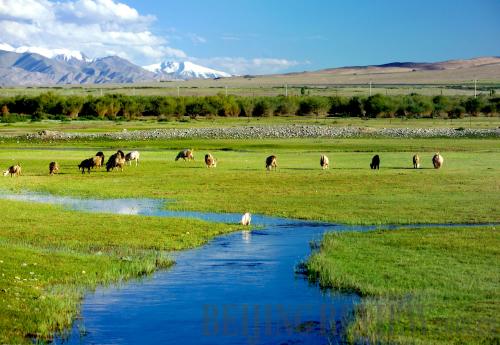|
 |
|
IDEAL ENVIRONMENT: The blue skies, limpid rivers and green mountains of Xinjiang Uygur Autonomous Region characterize the Chinese vision for a beautiful country (IC) |
What the Beijingers were most eager for over the last two months might be blue skies and clean air. At the beginning of the year, more than 1 million square km in east China were blanketed by heavy smog. Beijing enjoyed only five days of respite from hazardous weather in January. The hazardous smog once again reminds Chinese people and officials of the continual worsening of the natural environment following the last several decades of rapid development.
In his report to the opening of the 18th National Congress of the Communist Party of China last November, Hu Jintao, General Secretary of the Party's 17th Central Committee, gave high priority to making ecological progress and incorporating it into the whole process of advancing economic, political, cultural, and social growth. The report also introduced the concept of building a "beautiful country."
But how far is China from attaining this lofty goal? During the annual full session of the 12th National Committee of the Chinese People's Political Consultative Conference (CPPCC) in Beijing on March 3-12, the question became one of the hottest topics for political advisors from all walks of life.
 |
|
Gao Jixi (SHI GANG) | Facing the reality
"A good natural environment is essential to a well-off society," said Gao Jixi, Director of the Nanjing Institute of Environmental Sciences in Jiangsu Province. "That is to say, the people should also have a nice living environment while our country becomes prosperous."
 |
|
Wang Wenbiao (CFP) | Wang Wenbiao, President of the Elion Resources Group in Inner Mongolia Autonomous Region, said, "I hope China in the future is a country full of blue sky, green lands, clear water and clean air."
Speaking of a "beautiful country," most CPPCC National Committee members expressed similar ideas.
However, the current reality in China is not as satisfying. The seemingly ubiquitous pollution in air, water and soil, the worsening city waste crisis, as well as resource exhaustion, make the public feel anxious.
 |
|
Pan Biling (DUAN WEI) | Pan Biling, Deputy Director of the Environmental Protection Department of Hunan Province, has long kept a watchful eye on water pollution in the province. "The groundwater of some villages in Hunan is severely polluted, therefore, no local resident has passed the physical examination for military service in the last 10 years," Pan said. "Many villages are not the 'pure land' as we thought before, but all the food, vegetables and fruits people eat are produced in villages."
 |
|
Sun Taili (LI GUOWEN) |
Figures provided by Sun Taili, President of the Tianjin Qingda Group, show that of the 131 rivers flowing through cities in China, 36 are severely contaminated, 21 are heavily polluted and 38 are moderately affected. Water of the contaminated rivers permeates underground sources.
Sun also pays much attention to soil pollution. Accordingly, the consumption of chemical fertilizers and pesticides per unit of cultivated area in China is much higher than the global average. In addition to resulting in the hardening and poisoning of soil, their residue would also seep into the ground.
 |
|
He Wei (FILE) |
City waste is another major environmental concern. He Wei, President of private He's University in Liaoning Province, said that the per-capita annual trash output of Chinese citizens is about 440 kg. That is to say that the total annual trash output of China has reached 400 million tons, ranking first worldwide, and the figure is growing by 8 to 10 percent each year.
What is more, the accumulated quantity of garbage over the years has reached 6 billion tons. More than 200 cities are circled by garbage, with about 50,000 hectares of land covered with refuse. Waste collection, sorting and treatment infrastructure are still developing slowly.
 |
|
Ge Jianxiong (CFP) |
Ge Jianxiong, a professor at Fudan University in Shanghai, said, "Since the beginning of the 21st century, the living conditions of Chinese people have improved remarkably, but their dream of a beautiful habitat seems out of reach."
New road
Though there are some irresistible natural causes for the environmental problems, the main reason for pollution still lies in man-made factors, Gao said.
|
